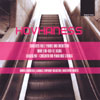Hovhaness Concerto for 2 Pianos; (3) Pieces for 2 Pianos
Exotically tinged works that belie the composer’s conservative reputation
View record and artist detailsRecord and Artist Details
Composer or Director: Alan Hovhaness
Genre:
Orchestral
Label: Black Box
Magazine Review Date: 11/2005
Media Format: CD or Download
Media Runtime: 56
Mastering:
Stereo
DDD
Catalogue Number: BBM1103

Tracks:
| Composition | Artist Credit |
|---|---|
| Concerto for 2 Pianos and Orchestra |
Alan Hovhaness, Composer
Alan Hovhaness, Composer Atakan Sari, Piano Globalis Symphony Orchestra Konstantin Krimets, Conductor Martin Berkofsky, Piano |
| Mihr |
Alan Hovhaness, Composer
Alan Hovhaness, Composer Atakan Sari, Piano Martin Berkofsky, Piano |
| Ko-Ola-U |
Alan Hovhaness, Composer
Alan Hovhaness, Composer Martin Berkofsky, Piano Sergei Podobedov, Piano |
| Vijag |
Alan Hovhaness, Composer
Alan Hovhaness, Composer Martin Berkofsky, Piano Sergei Podobedov, Piano |
| Lousadzak |
Alan Hovhaness, Composer
Alan Hovhaness, Composer Globalis Symphony Orchestra Konstantin Krimets, Conductor Martin Berkofsky, Piano |
Author: Andrew Farach-Colton
Alan Hovhaness bucked most of the late 20th century’s modernist trends, which may explain why his music doesn’t sound all that dated. The Concerto for Two Pianos (1954) could have been written yesterday, in fact; with its intermingling of raga and fugue, it’s the kind of east-meets-west venture that still seems to be the rage. Yet it’s also thornier music than those familiar with, say, the composer’s Mysterious Mountain Symphony (his best known work) might expect, and I could imagine it surprising those who think of him as bland.
There’s quite a bit of stark dissonance, particularly in the second movement, in which the pianists climb volatile symphonic terrain in jagged, quasi-atonal arpeggios. The solo parts are the opposite of flashy, though, and often seem to blend into the orchestra’s percussion section. When they do get a chance to step forward, however, pianists Martin Berkofsky and Atakan Sari make an impressive showing; the gamelan-like passagework in the finale, for example, chimes exquisitely.
Berkofsky gets more of a chance to flex his muscles in the Lousadzak Concerto (1944). Marco Shirodkar points out in the booklet-note that Hovhaness, who is so often thought of as a musical conservative, actually anticipated many soon-to-be-hip aleatory techniques. Note the nervous, chattering pizzicato that accompanies the piano’s stark cadenza: it’s actually ‘improvised’ by the strings. Less dramatically incisive than the Double Concerto, the music has a spare sensuality that’s equally, if not more, delectable.
In both concertos the Globalis Symphony Orchestra play expertly under Konstantin Krimets. Three exotically tinged pieces for two pianos fill out the disc and they, too, are sensitively rendered. An important and attractive addition to Hovhaness’s discography.
There’s quite a bit of stark dissonance, particularly in the second movement, in which the pianists climb volatile symphonic terrain in jagged, quasi-atonal arpeggios. The solo parts are the opposite of flashy, though, and often seem to blend into the orchestra’s percussion section. When they do get a chance to step forward, however, pianists Martin Berkofsky and Atakan Sari make an impressive showing; the gamelan-like passagework in the finale, for example, chimes exquisitely.
Berkofsky gets more of a chance to flex his muscles in the Lousadzak Concerto (1944). Marco Shirodkar points out in the booklet-note that Hovhaness, who is so often thought of as a musical conservative, actually anticipated many soon-to-be-hip aleatory techniques. Note the nervous, chattering pizzicato that accompanies the piano’s stark cadenza: it’s actually ‘improvised’ by the strings. Less dramatically incisive than the Double Concerto, the music has a spare sensuality that’s equally, if not more, delectable.
In both concertos the Globalis Symphony Orchestra play expertly under Konstantin Krimets. Three exotically tinged pieces for two pianos fill out the disc and they, too, are sensitively rendered. An important and attractive addition to Hovhaness’s discography.
Discover the world's largest classical music catalogue with Presto Music.

Gramophone Digital Club
- Digital Edition
- Digital Archive
- Reviews Database
- Full website access
From £8.75 / month
Subscribe
Gramophone Full Club
- Print Edition
- Digital Edition
- Digital Archive
- Reviews Database
- Full website access
From £11.00 / month
Subscribe
If you are a library, university or other organisation that would be interested in an institutional subscription to Gramophone please click here for further information.




